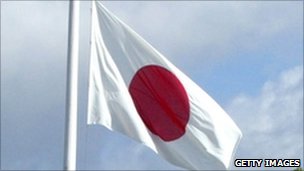 Japan has lost its spot as the world's second-biggest economy to China, figures out later are expected to show.
Japan has lost its spot as the world's second-biggest economy to China, figures out later are expected to show.
Fourth-quarter and full-year gross domestic product figures will be released by Japan at 0850 in Tokyo on Monday (2350 GMT Sunday).
Japan's economy has been hit by a drop in exports and consumer demand, while China has enjoyed a manufacturing boom.
At its current rate of growth, analysts see China overtaking the US as the world's top economy in about a decade.
"It's realistic to say that within 10 years China will be roughly the same size as the US economy," said Tom Miller of GK Dragonomics, a Beijing-based economic consultancy.
Racing ahead
There has been a debate over when exactly Japan was overtaken as the world's second biggest economy, with some analysts saying it happened in the third quarter of last year.
However, the full-year figures should give a more concrete comparison.
According to the International Monetary Fund, Japan's gross domestic product (GDP) was $5.39 trillion (£3.3 trillion) in 2010. China's preliminary figure shows its GDP last year was $5.75 trillion.
Japan's economy is expected to have grown by about 2.8% in 2010, according to the IMF. China's growth is expected to have hit a much more powerful 10% when the revised figures are released.
'Quite stunning'
The majority of China's growth has been funded by investment in manufacturing and the expansion of China's domestic industries and infrastructure.
Driving this has been a surge in exports after China became a production hub for multinational brands that wanted to benefit from low labour costs, and expanding road and rail links.
"There was an emphasis on infrastructure," said Duncan Innes-Ker of the Economist Intelligence Unit (EIU) in Beijing.
"They were building way ahead of where people thought the demand would be. And because the infrastructure was there, companies went there."
As China's economy grew, it created new jobs that saw people leave rural areas and farming, and pursue higher-paying work in the urban centres.
"The key thing was the enormous shift from people working in fields to moving into cities," said Mr Miller of consultancy GK Dragonomics.
"The urbanisation is a key structural change over the last 30 years."
At the same time, investment into China from abroad picked up, helping push the value of stocks and property to new highs.
"The level of investment in China is quite stunning," said the EIU's Mr Innes-Ker.
"In 2009, we saw almost 25% growth, year-on-year, in real terms of investment. That is unprecedented for a large economy."
'Lost decade'
By contrast, Japan has been struggling to come to terms with what many analysts call a "lost decade".
In the 1980s Japanese products such as electronics and vehicles were in demand globally, and at its peak the economy was growing at more than 7% annually.
But this in turn was fuelling a spending and borrowing spree, and by the 1990s bubbles had developed in the stock and property markets.
"Land value was unrealistic and the government tried to build its way out, debt ratcheted up and the productivity of the economy really suffered," said the EIU's Mr Innes-Ker.
Today, there are signs that Japan has manage to turn its economy around, but it is still dealing with the impact of an ageing population and low consumer demand



